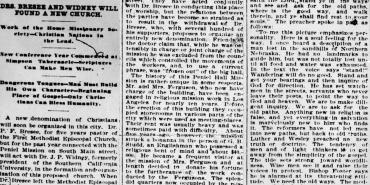4 Ways Not to Goof Up a Sermon

I really goofed up a sermon once. (Maybe more than once, but this particular incident stands out in my memory.)
In a seminary class, I preached a prepared sermon that came straight from my heart for the assigned text, Mark 10:13-16, on Jesus blessing the little children.
I spoke at length about how we can teach children the opposite of what Jesus intended by the way we treat them. I used several encounters with my father as examples of poor theological teaching.
The class was silent, and the silence was dreadfully uncomfortable. After feedback from the class and professor, I realized my mistake. I had unloaded an unhealthy dose of personal pain. The 'sermon' that day was not 'the word of the Lord.' It was my unexamined psyche exposed.
How can any preacher or communicator keep from repeating my mistake?
No 'clearinghouse' for sermons exists to make sure that they are everything they are supposed to be. Each preacher prepares his or her own sermon. The less time a preacher spends studying Scripture and becoming self-aware, the greater the possibility for bizarre ideas to come out as a 'sermon'--often things unhelpful for a congregation's spiritual development.
I have learned a lot since my seminary days. Let me share four understandings that can prevent a repeat of such a disastrous sermon:
1. Understand the text.
Immerse yourself in the Scriptures--both the story of the particular verses and the context surrounding them. Keep in mind the overarching story of God's plan for salvation and how the specific text fits into that plan.
Also, see what meanings other preachers have gleaned from this text. Both Christian friends and written commentaries have a lot to say. In fact, we have over 2,000 years of commentary to choose from, so there is no shortage of help.
2. Understand the culture.
The Bible was written at particular points in history in specific cultural settings. Again, the commentators and archaeologists can help us know what the words of the text meant to the first audiences who heard them.
3. Understand the congregation.
Reflect on all you know about what gives the individuals in the congregation hope and what causes them pain. Then, ask yourself this question: 'How does this biblical story intersect and impact their lives right now?'
4. Understand yourself.
Take time to become aware of and admit your own history. The congregation does not need to know the details, but you need to be attentive to its impact on your life--both spiritually and psychologically. Having a spiritual mentor or a psychological counselor is an excellent way to find your way through complicated feelings.
These four 'understandings' keep me from spouting personal pain when I should be speaking the word of the Lord. However, there can be an additional benefit: Each person in any congregation can improve his or her hearing of the word by applying these same four principles to weekly Scripture study.
Everett Leadingham is senior editor for the adult curriculum group at WordAction Publishing in Kansas City and is an ordained elder in the Church of the Nazarene.
Holiness Today, March/April 2010
Please note: This article was originally published in 2010. All facts, figures, and titles were accurate to the best of our knowledge at that time but may have since changed.




